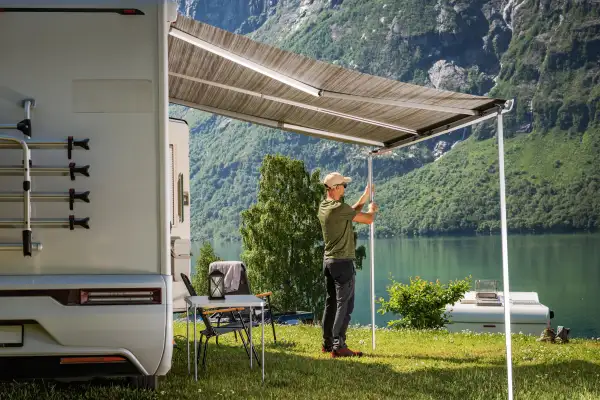Want to Buy an RV? Follow These Steps

Owning an RV can open a world of possibilities - the road stretching endlessly into the horizon, waking up to the sunrise over a picturesque lake. Yet there's a major roadblock to enjoying an RV. That, of course, is the need to buy one.
Like any major purchase, buying an RV should be a well-planned exercise. The right considerations and preparations will ensure that the reality of owning the vehicle lives up to the dream.
Do your background research
Here's what you should do after you've settled on buying an RV, but before you begin kicking the tires and checking the beds at a dealership:
Choose an RV type
The variety of RV you choose will guide more decisions down the road, so it's important to understand your options and narrow your choice early on.
- Towable RVs: This category includes all types and sizes of travel trailers, including those divided into separate living and working areas.
- Truck campers: These smaller campers can be mounted on the back of a sturdy truck, providing greater mobility in the backcountry.
- Class A motorhomes: The largest and most luxurious of motorcoaches, which may require a special driver's license in some states.
- Class B motorhomes: Often referred to as "camper vans," Class B motorhomes are the smallest of the driveable RVs. They're best suited to solo travelers or couples.
- Class C motorhomes: Moderate-sized motorcoaches that still offer the full functionality of larger Class A motorhomes, but in a smaller package.
The type of RV you should buy will depend on the types of trips you'll be taking, and the accommodations you need. For example, an entire family will have a difficult time fitting into a Class B motorhome. That said, you'll also have a tough time getting a bulkier RV along poor roads to more remote areas.
You should also consider any limitations to your own situation. For example, your current vehicle may not be able to pull a larger towable RV. Additionally, you should think about where you'll store your RV when you're not using it. Will it fit in your driveway, for example, or will you need to get (and pay for) a storage space?
Lastly, be realistic about your driving skills. If you won't be comfortable at the wheel of a large trailer or navigating narrow roads with a bus-sized vehicle, you may want to look into smaller options.
Budgeting for an RV
RVs cost plenty. In 2024, you could expect to pay an average of $61,891 for a new RV, or $56,313 for a used model, according to the RV Industry Association. The spending doesn't end with buying a vehicle. Your budget should also be able to accommodate the following ongoing costs of RV ownership:
- Interest on an RV loan: 47% of RV buyers finance their purchase, according to a 2025 survey from Go RVing. You can use an auto loan calculator to get an idea of how much your monthly payments might be. Typical RV loan rates currently range from around 8% to 16%, according to the RV club Good Sam.
- Registration fees: As with most other motor vehicles, RVs must be registered and bear license plates. Unlike most other passenger vehicle classes, the fee for registration may be based on the RV's weight and run to hundreds of dollars per year, depending on the state.
- RV insurance: Most states require you to purchase insurance for your motorhome, and lenders generally insist that financed RVs be insured. Towable RVs are usually covered by your car's liability coverage. However, collision and comprehensive insurance for trailers must be purchased separately. Check with your car insurance company (and preferably some of its competitors, too) to get a cost estimate before you buy an RV.
- Camping costs: You'll generally pay fees when you stay in a campground or RV park.
- Repairs, maintenance and upgrades: RVs degrade over time, so you'll have to keep up with repairs and maintenance if you want to stay rolling. Unfortunately, you can't necessarily go to a regular car mechanic for repairs. You'll have to take your vehicle to a repair shop that has the space and expertise to handle an RV.
New vs. used RVs
Whether you buy a brand-new or "pre-enjoyed" RV will affect the initial buying process and price. However, it will also have lasting implications that can affect how you use your vehicle.
Pros to a new RV
- Wider selection
- Has a factory warranty
- Greater expected reliability
- Easier to source repair parts
- Streamlined purchase process
- New features and technology
Cons to a new RV
- Higher purchase price
- Higher insurance premiums
- Hefty (up to 30%) hit for depreciation
Pros to a used RV
- Lower purchase price
- Lower depreciation
- Cheaper insurance premiums
Cons to a used RV
- May not be covered by a warranty
- Repair parts for older models may be scarce
- More potential for mechanical problems
- Greater likelihood of outdated designs and tech
- State registration can be more complicated
- Some campgrounds limit entry based on RV age
Dealership vs. private seller
When shopping for a used RV, you'll have the option to buy from a dealership or directly from a private seller. Buying from a private seller is often considered cheaper than from a dealership, since private sellers generally don't have an overhead to cover. Additionally, buying from a private seller may give you more room to negotiate the price and other considerations.
However, dealers have their advantages. Buying through a dealership gives you greater reassurance that you'll end up with a high-quality vehicle, since some carry out multi-point inspections of used RVs. They will also guide you through the paperwork of purchasing an RV, including title transfers and vehicle registration. If something goes wrong with your vehicle, most dealerships offer a warranty, so you can get your RV repaired at no cost within a certain time or mileage after the purchase.
Shopping for an RV
Having researched what you want in an RV, it's time to find the vehicle. Check with local dealerships and online listings for private sellers, and narrow your search to at least two vehicles, so you have something to compare.
It's best to shop for an RV in person so you can get a better idea of whether a specific model will fit your needs. Do a thorough walk-through of the exterior and interior. Try to picture what it would be like to set up and break down camp. Sit inside and visualize what a typical day would look like from sunrise to sunset.
As you hone in on a specific vehicle, you'll want to hire an RV inspector to make sure it doesn't have major issues or damage. Try to take the RV out for a test drive, though a private seller may be more hesitant about letting you do this if you lack RV experience. You'll also want to test out the RV's various features, including the shower, furnace and slide-outs.
Ask lots of questions along the way. If you're buying a used RV, for example, ask about the vehicle's history. How did the previous owner use it? Does the seller have a copy of the vehicle's maintenance history? If you're buying from a dealer, ask about any fees they may add to the price and special services they offer, such as appliance repair and winter storage.
Sealing the deal
When you finally identify the RV you want to buy, and where you'll be buying it, it's time to fine-tune its cost. You can try negotiating on the initial figure, which requires first researching the vehicle's market price. Even if you can't whittle the price down, you may be able to get free or discounted upgrades and add-ons. It's also a good idea to get preapproval letters from lenders, so you can see if the dealer can offer better financing options.
Before you can use your RV, it must be registered to you with your state. A dealership will typically handle this on your behalf. If you're purchasing from a private seller, though, you may need to register the RV yourself, and acquire a permit to transport an unregistered vehicle until you do complete the registration. Check with your state licensing department in advance, because each state has different registration requirements and fees.
Additionally, as with other vehicles, motorhomes in most states and financed RVs will need to be insured. Our picks for the best RV insurance combine familiar names in auto insurance with insurers that specialize in RVs.
Once these steps are completed, you're free to drive off with your RV. It's best not to venture too far initially. Try camping in your driveway for a night. That allows you to iron out any kinks in the experience and, if you can't quickly do so, to head into the house for the night. After you're at home in your RV, you'll be able to sail out confidently on the open road.



